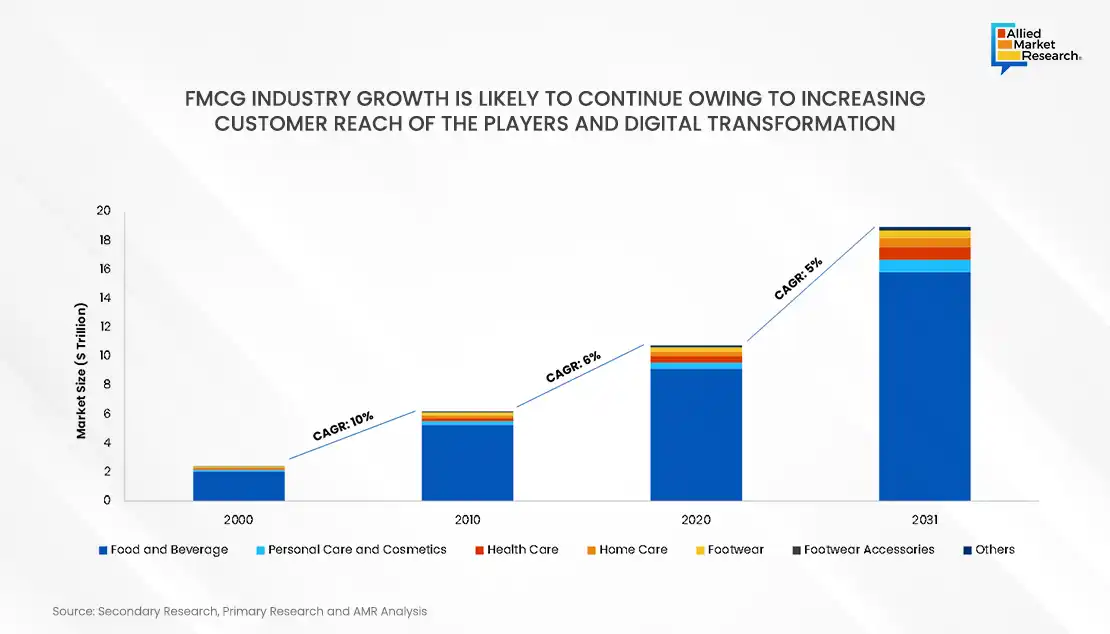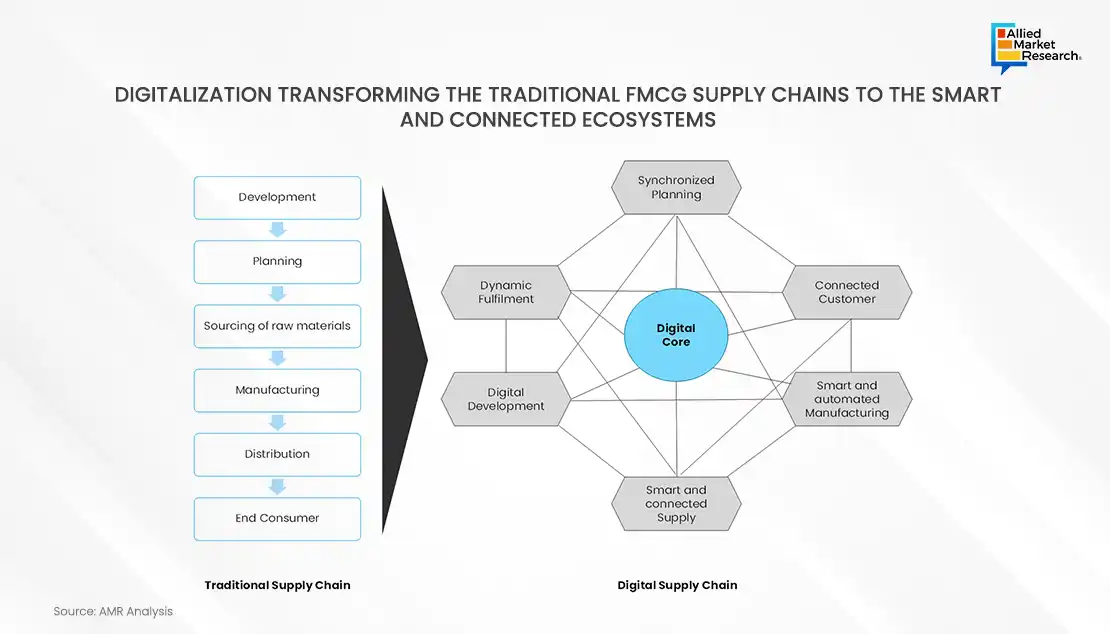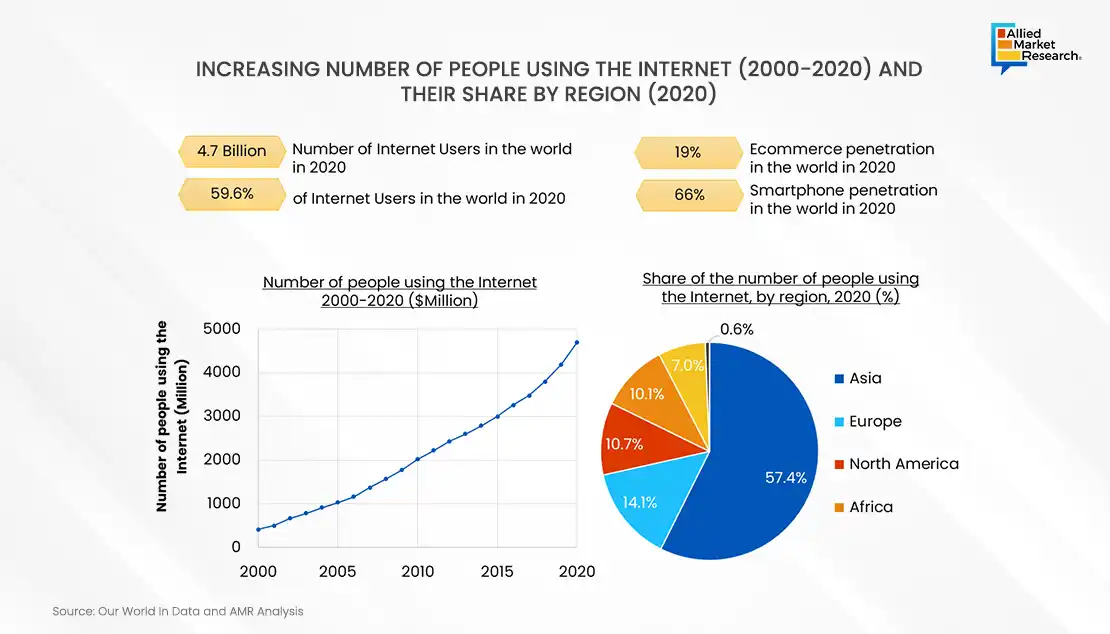Table Of Contents
- Adapting FMCG supply chains to global challenges
- FMCG Supply Chains transforming digitally in response to the impact of COVID-19
- Rising number of internet and smartphone users and big data analytics leading to the transformation of the front end of the FMCG Supply Chain
- Increasing Digital Infrastructure across the globe to facilitate the wider reach of the supply chain
- A shift towards more sustainable practices and eco-friendly packaging because of health-conscious customers
- What does digital transformation mean for economies, industries, and industry players?

Roshan Deshmukh

Koyel Ghosh
Digital Supply Chain Disruptions in the FMCG Industry

Fast-moving consumer goods are known for their high demand, low cost, quick consumption, frequent use high turnover rate, and high distribution. In the fast-moving consumer goods (FMCG) industry, the dynamics of supply chain management have undergone significant transformations in the last few years. The convergence of global markets, shifting consumer preferences, and technological advancements have propelled FMCG companies into a new era of innovation and adaptation.
Adapting FMCG supply chains to global challenges
The FMCG supply chain is a complex network that involves the production, distribution, and retailing of consumer goods. With the rise of globalization, supply chains have become increasingly interconnected, spanning across regions and continents. This interconnectedness has led to greater efficiency in sourcing raw materials, manufacturing products, and delivering them to end consumers. However, it has also introduced new complexities and digital supply chain disruptions have been playing pivotal role in the smoother function of the FMCG and likely to play a key role in the industry growth in the future.

In today's FMCG industry, the intense competition demands adaptability for success. It's not just about tailoring products to meet customer needs; being faster at reaching customers is what sets companies apart. Furthermore, emerging markets have opened up new avenues for FMCG players across the globe. Therefore, it has become important for companies to identify more effective supply chain strategies to reach out to their target customer segments. Consumer goods companies have been actively embracing globalization, which has resulted in more complicated supply chains and related processes. This shift has also led to challenges such as increased inventory, reduced working capital for new products, and narrower profit margins.
There are several challenges that FMCG companies are facing. They need to align their strategies to address these issues effectively. Some of the major challenges include:
- Product innovation and fulfillment within the available supply chain
- The need for quicker deliveries
- Cost-effectiveness
- Lack of end-to-end visibility and collaboration
FMCG Supply Chains transforming digitally in response to the impact of COVID-19
In response to evolving consumer preferences, FMCG companies have strategically integrated digital technology into their operations. These firms are expanding digital adoption across sales, logistics, stock management, and distribution systems, aiming to enhance long-term efficiency, profitability, and productivity. The use of real-time data has transformed how marketing and sales operate, enabling tailored user experiences that adapt to changing consumer preferences.
For instance, Unilever, one of the largest FMCG companies in the world completed the cloud-only enterprise transformation in 2023. This transformation will enable the company to accelerate product launches, enhance customer service, and improve operational efficiency.
P&G and Microsoft have collaborated for a long-term partnership. They plan to use a digital platform powered by the Internet of Things (IoT) to drive growth and innovation. Through implementing AI, machine learning, and edge computing services, P&G anticipates enhanced visibility across its operations, enabling the digitization and integration of data from over 100 manufacturing sites worldwide. This initiative helps P&G employees analyze production data quickly, so they can make better decisions right away. It's leading to big improvements in how well and how efficiently things are done.

After the pandemic, the FMCG industry started trying out new ways of doing business and using digital advancements to find more ways to make money. The widespread adoption of cloud-based operations has now become the standard. However, amidst this transition, the FMCG ecosystem encountered numerous challenges. Market demands fluctuated due to lockdowns, store closures, remote work, and supply chain disruptions prompted by COVID-19 impact.
Navigating the digital transformation journey posed significant hurdles. It was important to choose the right data and technology setups and invest accordingly to meet business goals. Additionally, ensuring the availability of skilled personnel proficient in digital technologies became essential. The industry implemented changes to make its work practices more resilient and agile.
Rising number of internet and smartphone users and big data analytics leading to the transformation of the front end of the FMCG Supply Chain
In today's landscape, the utilization of big data analytics is enabling FMCG companies to gain deeper insights into their customers' preferences. By leveraging individual purchase data through unique codes, companies can now understand customers' real-time behaviors and buying patterns. Big data analytics facilitates the tracking of customer locations, revealing whether purchases occur during daily commutes or weekly grocery trips. Companies have been collecting and analyzing data for a while to make informed business decisions. Now, this process has become more accurate and faster. Moreover, it enables companies to stay ahead of competitors by drawing actionable insights from data and implementing proactive strategies.
This surge in internet and smartphone users over the past two decades has revolutionized consumer behavior and expectations, presenting both challenges and opportunities for the FMCG industry. With a 132% increase in the total number of internet users from 2010 to 2020, the digital landscape has become an integral part of consumers' daily lives. This profound shift highlights the importance of digital transformation in the FMCG supply chain, as companies seek to leverage technology to meet evolving consumer demands and preferences.

As more consumers choose to shop and get information online, fast-moving consumer goods (FMCG) companies are changing the way they do things. They're upgrading their online systems, coming up with strong online shopping plans, and using data analysis to understand what customers want. With more people using the internet and smartphones, how products are sold, delivered, and used is changing. This means companies need to be quick and creative in how they manage their supply chains in the digital era.
Increasing Digital Infrastructure across the globe to facilitate the wider reach of the supply chain
In today's world of Industry 4.0, companies are using cutting-edge technology to gather instant data and make better decisions. This shift is changing how products are created, developed, and sold, blending online and offline retail experiences through Omni-channel retailing. Major acquisitions by industry giants like Amazon and Walmart highlight the importance of seamless shopping experiences. Concurrently, Supply Chain 4.0 emerges, digitizing supply chain processes and prompting strategic reassessment to achieve streamlined operations and efficiency gains. Digitalization in the food and beverage sector opens avenues for consumer convenience through e-commerce platforms and AI-driven operations, with forecasts suggesting potential operational cost reductions of up to 30%, emphasizing the transformative impact of digital evolution on supply chains and business strategies.

A shift towards more sustainable practices and eco-friendly packaging because of health-conscious customers
Along with digital transformation, consumer preferences are shifting towards sustainable and eco-friendly FMCG products, with over 70% of respondents indicating a willingness to pay a premium for such goods. This highlights how important it is for companies to adapt to consumers' increasing focus on the environment. Sustainable practices not only influence purchasing decisions but also potentially enhance pricing power for brands. Adapting to these trends necessitates transforming packaging to prioritize recyclability and renewability while addressing the needs of health-conscious consumers. Legislative mandates, such as UK packaging waste laws, require producers to implement recycling responsibility regimes, emphasizing reduction, landfill diversion, and increased recycling rates. To cater to consumer preferences for healthier options, the industry must diversify its product range with an emphasis on clean-label and natural products, while also considering eco-friendly packaging solutions. Reducing packaging weight and volume can significantly lessen environmental impacts associated with manufacturing and logistics, exemplified by flexible bag-in-box and pouch beverage packaging, which can reduce source material weight by up to 90%.
What does digital transformation mean for economies, industries, and industry players?
FMCG companies are facing major changes in how they manage their supply chains. Global markets and digital advancements are reshaping the industry, requiring companies to be more agile to stay competitive and meet consumer demands. Priorities now include adopting digital transformations and incorporating sustainable practices. The FMCG sector is moving towards a new era with changes in packaging and a focus on Omni-channel retailing. For the industry to thrive in the future, it needs to focus on sustainability, using digital tools, and creating innovations that prioritize consumers.
Industry 5.0 is the latest trend in manufacturing, emphasizing teamwork between people and machines. This approach can benefit fast-moving consumer goods (FMCG) supply chains by making them more flexible, efficient, and eco-friendly. Industry 5.0 values human input alongside advanced tech like AI, IoT, and robots. This teamwork can improve areas like product design, customized packaging, and connecting with customers.
Allied Market Research helps vendors by providing strategic insights and actionable intelligence to explore digital supply chain disruptions in the FMCG industry. Our thorough research and analysis offer a deep understanding of market dynamics, consumer trends, and emerging technologies. Collaborating with AMR enables vendors to optimize operations, capitalize on growth prospects, and implement customized solutions, thus ensuring sustained success in the dynamic digital environment.

